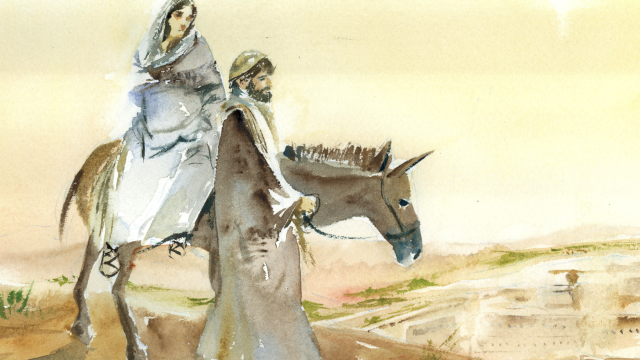Learning about growing in spiritual freedom

I wasn’t aware I had been withholding a part of my heart from God until the Holy Spirit graciously interrupted my life and invited me to the process of restoration. As a young girl, I fought an internal battle with feeling obligated to be what others wanted me to be. I could not imagine ever being loved or accepted as anything other than my parents’ “perfect” child.
I still grow ill thinking of decisions I made to hide evidence from my parents that I was, indeed, imperfect. I do not think they ever knew I struggled with this debilitating anxiety; I know they never expressed this expectation of me. However, I believed the lie that I had to be perfect to be loved or accepted by my parents very early in my life. Soon, I began to think I had to be perfect to be accepted by God and began hiding parts of my heart from Him. Or so I thought.
It was not until the lowest season of my life that I allowed God’s truth to overwhelm my heart. Four months before a particular Sunday morning encounter with God, my mother passed away. Twenty months earlier, my sister had died. In less than two years, I lost two of my very best friends.
Heartbreaking Loss
We all prayed for my sister’s healing for the two months following her diagnosis, only to watch cancer rapidly and viciously destroy her body. My mother was rushed to the hospital after a heart attack; she lay in a coma for three days as we continuously asked God to awaken her. She never spoke to me again. My sister and mother were Christian women, and I knew they were “better off” and “all their pain was gone.” Mine was unyielding.
That Sunday morning, dutifully sitting in church, empty and filled with profound grief, I heard God speak, “Deborah, you don’t feel the way you do today because your mother died. You feel the way you do today because I don’t have the place in your heart I desire.”
From the depths of despair, I cried back to God, “If you can remove this pain from my heart, I will give you anything.”
Not in a while, but instantly, the grief was gone. Not a little of it, but every bit of the persistent heavy weight of depression I carried for months was gone. God healed my broken heart; I had to follow through on my promise to give that heart entirely to Him. At that moment, I had no idea what that meant.
It’s a Journey
Though God healed my heart instantly, He knew the damage was deeper than relief from my sadness would provide. Therefore, God called me to journey with Him to a new level of relationship that would restore the joy of salvation I could not experience in a life of following rules. Though I had faithfully served Him most of my life, my notion of relationship with God depended solely on my obedience, not His love or grace. Oh, I had certainly sinned, but I was nothing like the “prodigal son” who intentionally dishonored, disobeyed, and disregarded his father (Luke 15).
I lived with one primary goal—pleasing God. Unfortunately, that focus produced a daughter very much like the prodigal son’s older brother. Like him, I stayed at home, as it were, and lived obediently, honorably, tired, and angry. Exhausted from living under the heavy hand of a God who demanded my perfection, I could find no solace from such an exacting sovereign when my sister and then my mother died.
So my God intervened to heal me from the damage in the hidden places of my heart. I am still overwhelmed some 20 years later that the Creator of the universe stepped into a small Georgia church one Sunday morning just to heal my broken heart and confused mind. With King David, I have often asked Him, “Who am I that you are mindful of me?” (see Ps. 144:3).
And then I remember; it is not about me. It is about God, a sovereign God, who graciously determined a plan of redemption and restoration for me (and you) before time even began. And He is still writing that story in every heart that submits to Him.
Joy in a Relationship of Love
Salvation doesn’t mean God regards us as perfect; it means we are declared righteous. Salvation means Christ reconciled us to God and that we are beginning a journey of growth toward being restored to His perfect image, which we lost when Adam sinned. By His grace, through Christ’s sacrifice and strengthened by the Holy Spirit, I learned to trust God’s process of making all things new again.
He has taught me that He desires that we enjoy the freedom that comes only from a relationship that transcends the letter of the law. Still, He has taught me that it remains our decision to journey with Him or not. Growth, restoration, sanctification (choose your term) is not prerequisite to a relationship with God; it is the joy of living in His love that gives us the thrill of this journey.
You may not have listened to the lie that demands your perfection. But you may sometimes have become disappointed in your faith because a different portion of your heart remains in captivity. Maybe an area of your heart has been held captive by anger, pride, racism, legalism, self-doubt, self-promotion, bitterness, unforgiveness, complacency, addictions, envy, lust, fear, arrogance, or, well, you fill in the blank. If so, God is inviting you to walk with Him in this journey of restoration.
But wait! Christ redeemed me from the captivity of sin; He paid my ransom, showed God His scars. My forgiveness has already been accomplished. Isn’t sanctification just legalism if it’s about living better, behaving more religiously, doing better works? Maybe that question puts our emphasis in reverse.
Sanctification is not about what we have to do; it’s about what we are privileged to do, and I’m not talking about the works we get to do. God has invited us to reflect our Savior’s glory, and all the more as we grow in holiness. Our renewed minds, our redeemed hearts cry out for the joy of becoming restored to the image of our Redeemer.
Therefore, when we don’t participate with God in the journey of restoration, our souls become overwhelmed with disappointment. And maybe our empty feeling is because there’s a part of our heart we have withheld from Him.
A Personal God
Solomon lamented that God set eternity in his heart and then left him to live a life of momentary pleasures. It should have been clear to Solomon that God was concerned not only with his final destination; He was very concerned with his journey there. He still is. God didn’t rapture us at the moment of our salvation. He wanted us to experience and participate with Him in restoring what sin destroyed, both in our lives and through our lives here on earth. He knew that if we surrendered to Him in this process of sanctification/restoration, we would increase as image bearers who could change our world for eternity. And He knew our souls would experience their greatest joy and freedom in this surrender.








